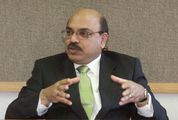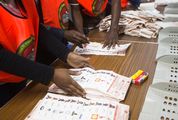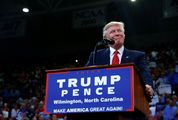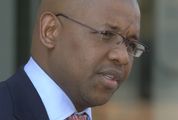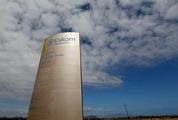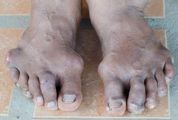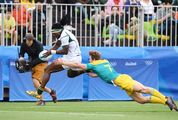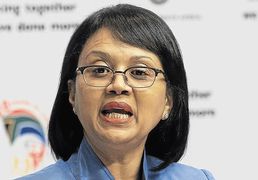NELSON Mandela had critical meetings with South Africa’s major business executives after his release from prison, helping pave the way to a more pragmatic approach to the economy as it emerged from decades of apartheid and isolation.
It was to be the start of many critical interactions for the president of the African National Congress (ANC) after 27 years in prison, cut off in large part from the economic debate. The ANC had a low regard for business in South Africa, seeing it as benefiting from apartheid.
After his divorce from Winnie Madikizela-Mandela, Mandela stayed with Clive Menell, whose father had founded the Anglovaal group, with stakes in mining, financial services and other key industries. During his stay, discussions about the economy were held late into the night, said Rick Menell, son of Clive. "My dad got involved in many substantial discussions with him, and one of them led to the formation of the Brenthurst Group where Mandela could bring his economic policy people to meet business leaders," Mr Menell said.
"It was important to introduce people personally and try to build an understanding of where the ANC was coming from and an understanding of its Freedom Charter, which was concerning business.
"In the early 1990s he reached out to, and was reached out to by, business people and there were talks about how the private sector and government worked."
Clive Menell had taped episodes of Yes, Minister sent from the UK, which he and Mandela would watch mainly for laughs, but also tips on governance, Rick said.
The first meeting with business after his release from prison, however, was at his house in Soweto when he was visited by Anglo American chairman Gavin Relly and his assistant Michael Spicer.
Mr Relly, a fierce opponent of nationalisation after watching the destruction wrought on Anglo’s copper assets in Zambia, led a delegation of businessmen to meet the ANC’s leadership in Zambia in 1985. "We talked broadly about labour issues," Mr Spicer said.
"When we emerged all the journos stuck their microphones up Gavin Relly’s nostrils and asked about nationalisation. He said that funnily enough that the word wasn’t uttered once in the 45 minutes we spent with Madiba ."
At a conference between business and ANC heavyweights shortly afterwards, Mandela told delegates business had better get used to the idea of nationalisation. But many meetings, formally and informally, led to a change of mind.
"There were multiple doses of reality administered at many levels," Mr Spicer said. It was meetings with Chinese and Vietnamese delegates at a World Economic Forum meeting in Davos where the ANC delegation was asked why it was sticking to such outdated policies when they were embracing forms of capitalism.
One of Mandela’s important decisions about the economy, particularly for mining, was delaying the discussion about ownership of the mining sector until the late 1990s, instead of spooking the market in 1994.
South Africa’s economy in the early 1990s was largely held by a dozen enormous conglomerates, which made negotiations between the ANC and business a great deal easier.
"It was rational in that it spoke to the constrained circumstances and the fact that we were a bottled-up economy forced into these measures, but it was extremely useful in the transition because you could get strong collective leadership around a table," Mr Spicer said. "You didn’t need to go through multiple levels of fractured business organisations, racial divisions and so on, which you have now."
Mandela asked Harry Oppenheimer to set up meetings with business to consult them on economic issues. These Brenthurst Group meetings were critical to developing personal bonds and addressing the deep mistrust between the ANC and business.
"The meetings were congenial," Mr Spicer said. "Madiba was always friendly and interested, but ultimately it was his agenda … we talked very widely on a huge range of issues."
Bobby Godsell, who attended the meetings, said they were meetings of strangers, but were nonetheless productive, though much still needs to be done to get the economy going. "The work that remains to be done and the best way to honour the legacy of Mandela is to complete these tasks in a detailed and consequential way, work out how we can create a prosperous South Africa."
To this end, he said, the National Development Plan (NDP) had to be implemented. "The NDP is the spirit of the Brenthurst Group recreated in the form of the planning commission."
Business leaders of the time when Mandela was president became accustomed to receiving calls from him to donate money to build schools or donate computers to schools. Mr Menell said it was a way of assessing and convincing the ANC of business’s goodwill.
Mr Spicer added that it was not always kindliness, but sometimes there was calculation. "He played business people extraordinarily well and shrewdly when he wanted things from them.
"He was not averse to using his charm for new schools and the like ."
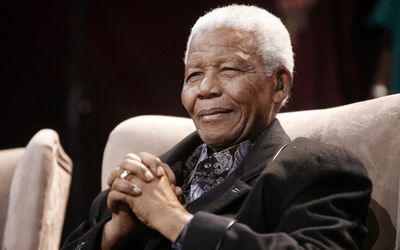
Former president Nelson Mandela attends the sixth Nelson Annual Mandela lecture in Kliptown, near Johannesburg, in this July 12 2008 file photo. Picture: REUTERS
NELSON Mandela had critical meetings with South Africa’s major business executives after his release from prison, helping pave the way to a more pragmatic approach to the economy as it emerged from decades of apartheid and isolation.
It was to be the start of many critical interactions for the president of the African National Congress (ANC) after 27 years in prison, cut off in large part from the economic debate. The ANC had a low regard for business in South Africa, seeing it as benefiting from apartheid.
After his divorce from Winnie Madikizela-Mandela, Mandela stayed with Clive Menell, whose father had founded the Anglovaal group, with stakes in mining, financial services and other key industries. During his stay, discussions about the economy were held late into the night, said Rick Menell, son of Clive. "My dad got involved in many substantial discussions with him, and one of them led to the formation of the Brenthurst Group where Mandela could bring his economic policy people to meet business leaders," Mr Menell said.
"It was important to introduce people personally and try to build an understanding of where the ANC was coming from and an understanding of its Freedom Charter, which was concerning business.
"In the early 1990s he reached out to, and was reached out to by, business people and there were talks about how the private sector and government worked."
Clive Menell had taped episodes of Yes, Minister sent from the UK, which he and Mandela would watch mainly for laughs, but also tips on governance, Rick said.
The first meeting with business after his release from prison, however, was at his house in Soweto when he was visited by Anglo American chairman Gavin Relly and his assistant Michael Spicer.
Mr Relly, a fierce opponent of nationalisation after watching the destruction wrought on Anglo’s copper assets in Zambia, led a delegation of businessmen to meet the ANC’s leadership in Zambia in 1985. "We talked broadly about labour issues," Mr Spicer said.
"When we emerged all the journos stuck their microphones up Gavin Relly’s nostrils and asked about nationalisation. He said that funnily enough that the word wasn’t uttered once in the 45 minutes we spent with Madiba ."
At a conference between business and ANC heavyweights shortly afterwards, Mandela told delegates business had better get used to the idea of nationalisation. But many meetings, formally and informally, led to a change of mind.
"There were multiple doses of reality administered at many levels," Mr Spicer said. It was meetings with Chinese and Vietnamese delegates at a World Economic Forum meeting in Davos where the ANC delegation was asked why it was sticking to such outdated policies when they were embracing forms of capitalism.
One of Mandela’s important decisions about the economy, particularly for mining, was delaying the discussion about ownership of the mining sector until the late 1990s, instead of spooking the market in 1994.
South Africa’s economy in the early 1990s was largely held by a dozen enormous conglomerates, which made negotiations between the ANC and business a great deal easier.
"It was rational in that it spoke to the constrained circumstances and the fact that we were a bottled-up economy forced into these measures, but it was extremely useful in the transition because you could get strong collective leadership around a table," Mr Spicer said. "You didn’t need to go through multiple levels of fractured business organisations, racial divisions and so on, which you have now."
Mandela asked Harry Oppenheimer to set up meetings with business to consult them on economic issues. These Brenthurst Group meetings were critical to developing personal bonds and addressing the deep mistrust between the ANC and business.
"The meetings were congenial," Mr Spicer said. "Madiba was always friendly and interested, but ultimately it was his agenda … we talked very widely on a huge range of issues."
Bobby Godsell, who attended the meetings, said they were meetings of strangers, but were nonetheless productive, though much still needs to be done to get the economy going. "The work that remains to be done and the best way to honour the legacy of Mandela is to complete these tasks in a detailed and consequential way, work out how we can create a prosperous South Africa."
To this end, he said, the National Development Plan (NDP) had to be implemented. "The NDP is the spirit of the Brenthurst Group recreated in the form of the planning commission."
Business leaders of the time when Mandela was president became accustomed to receiving calls from him to donate money to build schools or donate computers to schools. Mr Menell said it was a way of assessing and convincing the ANC of business’s goodwill.
Mr Spicer added that it was not always kindliness, but sometimes there was calculation. "He played business people extraordinarily well and shrewdly when he wanted things from them.
"He was not averse to using his charm for new schools and the like ."


